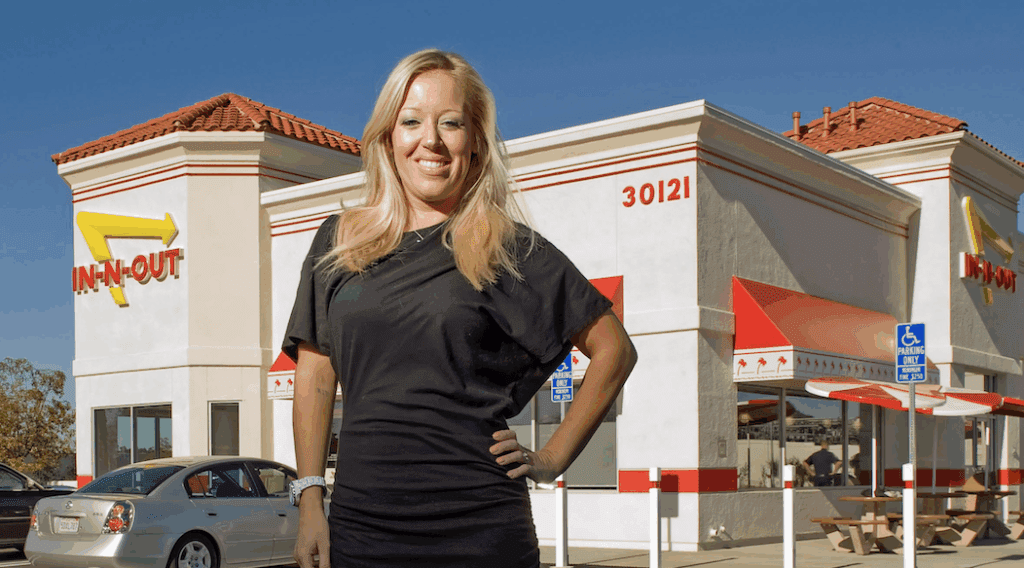In-N-Out Burger, a beloved fixture on the West Coast since 1948, is making headlines as its billionaire president, Lynsi Snyder, announces her family’s relocation from California to Tennessee. This move aligns with the company’s expansion plans and raises intriguing questions about the financial implications of such a significant step.
From Burger Shack to Billionaire Heiress
In-N-Out was founded by Lynsi Snyder’s grandparents, Harry and Esther Snyder, in Baldwin Park, California. Originally a small family-run business, the franchise gained a cult following throughout Southern California. Under the leadership of Lynsi’s uncle, Rich Snyder, during the late ’80s and early ’90s, the company began a substantial expansion. The establishment of headquarters, new locations, and modernization efforts played pivotal roles in transforming In-N-Out into a fast-food empire.
Following Rich’s tragic death in a plane crash in 1993, control passed to his brother, Guy Snyder, Lynsi’s father, who continued the expansion but eventually succumbed to addiction issues. After Guy’s accidental overdose in 1999, a 17-year-old Lynsi became the sole heir to the family business. Through carefully structured family trusts, she gradually assumed full ownership, finally taking control at 35 in 2017 and stepping into the role of president.
Multiple Motivations for Moving
During a recent podcast interview, Snyder shared her reasons for relocating to Tennessee, highlighting the difficulties of raising a family and operating a business in California. While these sentiments are valid, many speculate that there are additional strategic financial factors behind the move.
California’s tax structure is known for its challenges, particularly for high earners. The state has the highest personal income tax rate in the nation, which includes a long-term capital gains tax of 13.3%. In contrast, Tennessee imposes no personal income tax, providing significant financial incentives for Snyder, who stands to save considerably if she relocates before any potential company sale.
Impact on Company Valuation
If In-N-Out were ever to be sold, it would likely have a conservative valuation of around $10 billion. Under California tax laws, selling the company while living in the state could result in a tax obligation of $1.3 billion. However, establishing residency in Tennessee for a year prior to selling could mean she pays zero state taxes on a potential sale.
In-N-Out’s impressive revenue—estimated at $5 billion annually from approximately 425 locations—suggests a strong market position. Each location generates around $12 million in revenue, significantly higher than many competitors. Thus, speculation abounds that if Sierra were to sell, she could save substantial amounts in taxes, potentially reaching $2.6 billion if sold at a $20 billion valuation.
Lessons from Other Wealthy Californians
Lynsi Snyder’s decision is not isolated; other high-profile Californians, including Elon Musk and Larry Ellison, have made similar moves to lower-tax states like Texas and Florida. Such migrations often stem from the desire for more favorable taxation and business environments, alongside improved quality of life.
Snyder’s departure holds symbolic weight, as In-N-Out has long represented California’s culture and identity. As she transitions to Tennessee, it raises broader questions about the state’s evolving business landscape and its implications for both families and businesses alike.

Meet William, a proud Bethel University alumnus with a fervent passion for lifestyle and culture topics. His keen interest doesn’t stop there; he’s also deeply engrossed in current events of all kinds. William dedicates himself wholeheartedly to this site, thriving on the collaborative energy he shares with Suzanne, his long-standing partner in crime.
Having navigated their university courses side by side for years, their teamwork on the site is nothing short of dynamic. Together, they bring a unique blend of insights, proving that two heads are indeed better than one in delivering compelling content.













